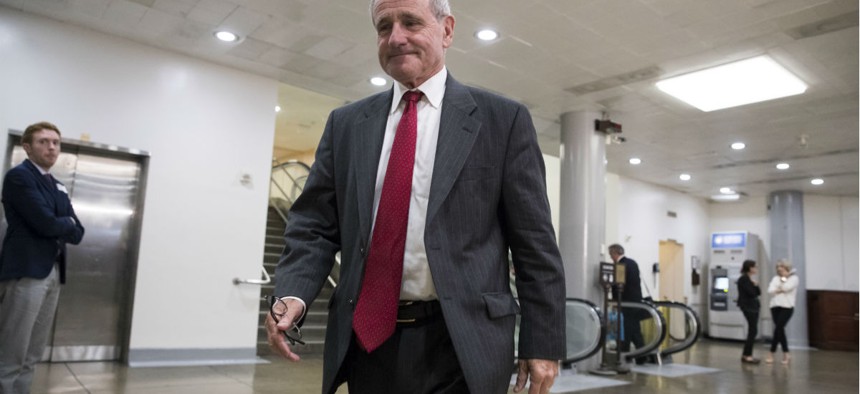Senator Explains His Warning About 'Biblical' Conflict With North Korea
The Idaho Republican also says there's no "bloody nose" strategy: "What a dumb thing to do."
At a recent security conference in Munich, Senator James Risch cautioned that a “very brief” conflict “of biblical proportions” could erupt between the United States and North Korea, leaving in its wake “mass casualties the likes of which the planet has never seen.” He then promptly left his stunned audience to catch a flight. This week, back in Washington, D.C., the Idaho Republican explained the warning. He expressed some hope that economic sanctions and other pressure will make North Korean leader Kim Jong Un rethink his pursuit of nuclear weapons. But if that doesn’t happen, he suggested, the nuclear threat from North Korea is so exceptional that the Trump administration could feel obligated to embark on an all-out war.
The press reacted to Risch’s remarks in Munich with “headlines about Trump wanting to go to war.” That, he told me, “was 180 degrees from the message that I was trying to convey. … The headline should have been: ‘If Kim Jong Un keeps doing what he’s doing, he’s gonna cause a war.’”
Risch is a senior member of the Senate Intelligence and Foreign Relations Committees; he just returned from a visit to South Korea as part of Donald Trump’s delegation to the Closing Ceremony of the Winter Olympics. He has spoken extensively about North Korea with the president and other top administration officials. The American president doesn’t want war, Risch said, but “I firmly believe that he is strongly committed to defending the country. ... Whether you like or dislike President Trump, you have to admit he is a person of strong will.”
Journalists missed the significance of his Munich comments in their zeal to take shots at Trump, he said. The outcome of the crisis is “in one person’s hands, and that’s Kim Jong Un”—who, according to Risch, is now facing a choice between two starkly different paths: “One path will result in the consequence that his regime … stays in power, and he continues as head of that state. The other path ... is going to result in all likelihood in a termination of his regime. It is not the policy of the United States to pursue regime change. We do not want that. But these are his choices, not ours.”
In an interview with The Spokesman-Review, Risch had suggested that the scenario he had in mind in Munich was how the United States would respond to North Korea’s use of a nuclear weapon. But in our conversation he declined to specify a “red line” that, if Kim crossed it, would spark U.S. military action. Risch observed that “the president of the United States has said that he will not allow, tolerate a condition whereby North Korea has the capability of delivering a nuclear weapon by an [intercontinental ballistic missile] to the United States homeland”—a milestone that, according to Trump’s CIA director, the North is only months away from reaching. “I’m not at liberty to say what [the] tipping point is,” Risch told me, but Trump should be taken at his word.
“The president of the United States has said over and over again that he does not telegraph what and when and how he is going to do something,” he continued. “He proved it once in Syria, in response to [President] Assad using chemical weapons against his people, and he proved it a second time in Afghanistan when he delivered” the “mother of all bombs” against ISIS targets. “Both of those times that he pulled the trigger were very surgical, very direct, accomplished exactly what they were supposed to accomplish.”
Risch denied, however, that the Trump administration is seriously considering a limited, symbolic “bloody nose” strike on North Korea, as reports have repeatedly indicated in recent months. “I have personally discussed [it] with the people who gave the president the [military] options,” he said. (Senators Jeanne Shaheen and Sheldon Whitehouse have said the person who made these assurances was National-Security Adviser H.R. McMaster; Risch wouldn’t confirm or deny that.) The administration officials “looked me in the eye and said, ‘Stop this. There is no such thing as a “bloody nose” strategy. We did not give the president that strategy. He does not have that strategy. It is not the policy of the United States.’” The idea isn’t credible, Risch added: “What a dumb thing to do. If you punch somebody in the nose, they’re not gonna stop and catch their breath. They’re gonna punch back and this thing gets away from you really, really quickly.”
But just as remarkable as his dismissal of the “bloody nose” buzz was his message that a nuclear-armed North Korea would pose so grave a risk to the United States that, in order to prevent it, the Trump administration is prepared to wage a war against the Kim regime that experts estimate could kill hundreds of thousands if not millions of people, and escalate into nuclear warfare. Why the U.S. would enter into such a catastrophic conflict in the absence of an actual or imminent North Korean attack is “an equation that only the president could answer,” Risch said. “What you’d be looking at would be on a scale: What are the risks you’re running by not doing it?”
North Korea shouldn’t be lumped together with nuclear powers like Russia and China that have the capacity to nuke the United States but have been deterred from doing so, Risch argued. “I don’t lay awake at night worrying that the United States and Russia are going to get into a fight lobbing nuclear weapons back and forth. … After World War II, when the arms race started, both parties wound up with enough nuclear weapons to wipe out the other party. Both of them realized it, they sat down together, they reached a number of treaties, and they put in place really strict, really clear protocols of telephone calls and communications that will avoid this. Both parties know what the ultimate consequence of [war] is, which is mutual destruction.”
In the case of North Korea, “none of that is in place,” he noted. “What if somebody miscalculates? What if there is an accident? … That is as much a danger as an intentional act. And there’s no protocol in effect for the red phone to ring in the White House and the other one to ring in Pyongyang and say, ‘Hey why don’t we stop and talk about this?’” Russia and China “know exactly what we’re thinking and we know exactly what they’re thinking. With the North Koreans, I listen to what they say but you say to yourself, ‘Can they possibly be thinking like this? And does [Kim Jong Un] really misperceive who he’s dealing with?’ This is a country with pea-shooters taking on a country that’s got the power and force that America does. Now don’t get me wrong: With what they have, they can do tremendous damage right there on the peninsula and for that matter in the whole neighborhood. There’s a lot of countries that they can reach.”
Isn’t the possibility of miscalculation a good argument for talking to the North Koreans, if only to handle crises? “Of course it is,” Risch said. “Civilized people would do that, wouldn’t they?” But North Korea’s “recklessness” and “maliciousness” mean that its leaders are “entirely different than the civilized people we’re dealing with who are nuclear powers,” he said.
Nor does he see much promise for a diplomatic breakthrough resulting from the Olympics. “I subscribe to the president’s theory that talking is good,” he said. “In the middle of the closing ceremonies of the Olympics, all of our cell phones went off at the same time to indicate that the South Koreans had announced that the North Koreans were ready to talk. And we were surprised. Now what does that mean? We don’t know yet. Our history of talking with the North has not been good. … They made demands before they’d even sit down at the table—they wanted food, they wanted oil and fuel, they wanted release of sanctions, and those were all given to them when the talks started last time. That is not going to happen this time.”
Risch hopes the severe sanctions that the Trump administration has imposed on North Korea will have an impact on the trajectory of the crisis. Yet here too he has his doubts. “Is [Trump’s “maximum pressure” campaign] causing them grief? Yes it’s causing them grief,” he said. “Has it caused them to change their thinking and their actions? Not yet.” The administration just implemented strong measures against ships and shipping companies that are helping North Korea evade restrictions on importing and exporting fuel, he noted. But in terms of sanctions, “we’re about at the end of the road as far as the kinds of things we can do.”




